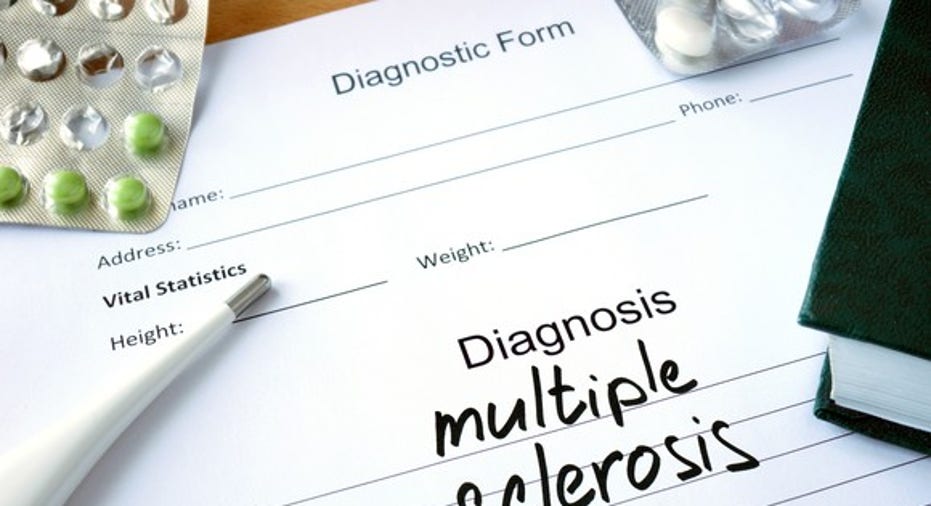Biogen Inc Makes Up for Lackluster Revenue Growth

Biogen's (NASDAQ: BIIB) fourth-quarter revenueleft something to be desired, but the biotech made up for the lackluster growth with a curtailing of expenses, resulting in a solid 12% increase in adjusted earnings per share.
Image source: Getty Images.
Biogen results: The raw numbers
|
Metric |
Q4 2016 |
Q4 2015 |
Change (YOY) |
|---|---|---|---|
|
Revenue |
$2.87 billion |
$2.84 |
1% |
|
Income from operations |
$886 million |
$1,168 million |
(24%) |
|
Adjusted earnings per share |
$5.04 |
$4.50 |
12% |
Data source: Biogen.
What happened with Biogen this quarter?
- The 1% revenue growth came from a mixed bag, with top-selling Tecfidera setting the pace with a 1% year-over-year increase, but Biogen's other multiple sclerosis drugs not performing as well; its interferon franchise was down 7% year over year, and Tysabri sales fell 1% year over year.
- Recently launched hemophilia drugs, Eloctate and Alprolix, had a good fourth quarter, up 47% and 31% respectively, but they're being spun out into Bioverativ, which is set to be completed on February 1.
- Biogen's newest approved drug, Spinraza, which was developed with Ionis Pharmaceuticals (NASDAQ: IONS), managed just $5 million in sales in the fourth quarter. But the company has a good excuse: Spinraza was approved on December 23, giving Biogen just four business days to launch the drug before the end of the quarter.
- GAAP earnings were affected by a settlement with Forward Pharmaover patents on Tecfidera. Backing that out, the discrepancy between tepid revenue growth and solid adjusted earnings growth came from a curtailing of research and development expenses as well as a lower tax rate.
What management had to say
CEO Michel Vounatsos said Spinraza, which treats spinal muscular atrophy, is Biogen's "most exciting commercial opportunity for 2017," but he noted that reimbursement is choppy in the early part of the launch. "Our goal is that no patient will forgo treatment because of financial limitation or insurance status, and we are pleased with the progress made so far," Vounatsos said. It is the best long-term solution for Biogen and Ionis Pharmaceuticals because those patients getting free drugs now will likely be paying customers eventually.
Biogen has an Alzheimer's disease drug, aducanumab, which targets amyloid, the same protein targeted by Eli Lilly's (NYSE: LLY) solanezumab, which failed its phase 3 trial last year. But there are enough differences in the trial design, including primary endpoints of the two trials, and differences in the way the drugs target amyloid plaques, that Biogen's chief medical officer Al Sandroc isn't worried about his competitors failures: "I am not sure you could read too much into the [solanezumab] result and infer anything on what we're going to see with aducanumab."
Looking forward
Management is looking for revenue of $11.1 billion to $11.4 billion this year, which is lower than the $11.45 billion it managed in 2016, but keep in mind that Bioverativ is being spun off, so there will only be one month of hemophilia drug sales in the 2017 results. Backing those sales out, Biogen is looking for 5% to 7% growth for the products that will remain with the company.
While Biogen is losing revenue from its hemophilia drugs, it's also shedding the expenses for pipeline drugs in that category, so management thinks adjusted earnings per share will fall in the range of $20.45 and $21.25 this year, up from $20.22 per share last year.
10 stocks we like better than Biogen When investing geniuses David and Tom Gardner have a stock tip, it can pay to listen. After all, the newsletter they have run for over a decade, Motley Fool Stock Advisor, has tripled the market.*
David and Tom just revealed what they believe are the 10 best stocks for investors to buy right now...and Biogen wasn't one of them! That's right -- they think these 10 stocks are even better buys.
Click here to learn about these picks!
*Stock Advisor returns as of January 4, 2017.
Brian Orelli has no position in any stocks mentioned. The Motley Fool owns shares of and recommends Biogen and Ionis Pharmaceuticals. The Motley Fool has a disclosure policy.



















